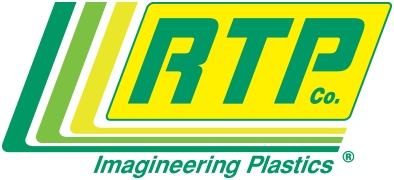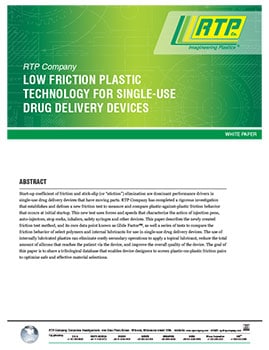White Paper
Start-up coefficient of friction and stick-slip (or “stiction”) elimination are dominant performance drivers in single-use drug delivery devices that have moving parts. RTP Company has completed a rigorous investigation that establishes and defines a new friction test to measure and compare plastic-against-plastic friction behavior that occurs at initial startup. This new test uses forces and speeds that characterize the action of injection pens, auto-injectors, stop cocks, inhalers, safety syringes and other devices. This paper describes the newly created friction test method, and its core data point known as Glide FactorSM, as well a series of tests to compare the friction behavior of select polymers and internal lubricants for use in single-use drug delivery devices. The use of internally lubricated plastics can eliminate costly secondary operations to apply a topical lubricant, reduce the total amount of silicone that reaches the patient via the device, and improve the overall quality of the device. The goal of this paper is to share a tribological database that enables device designers to screen plastic-on-plastic friction pairs to optimize safe and effective material selections.
Objectives
This paper is intended to help the engineering design community make better decisions for plastic-onplastic friction applications for single-use medical devices.
- Create a reliable new test method for measuring friction values in internally lubricated thermoplastics for single-use medical devices.
- Validate the resulting friction test measurements with industry accepted tribology information.
- Establish a database of tribological values that allow design engineers to predict single-use friction performance in medical devices.
- Provide a review of available internally compounded thermoplastic wear and friction technologies to reduce stick-slip phenomena, improve freedom of movement, and increase reliability. These technologies include silicone fluid, polytetrafluoroethylene (PTFE), molybdenum disulfide, boron nitride, graphite powder, perfluoropolyether (PFPE) fluid, fibers, and all polymeric wear additives (APWA).





